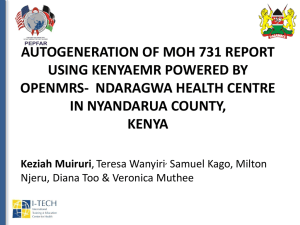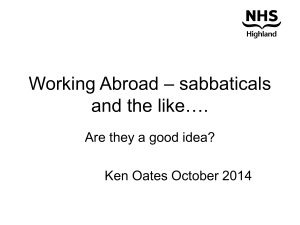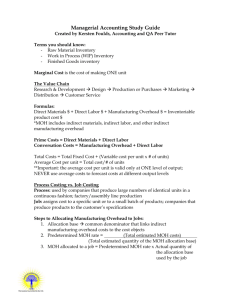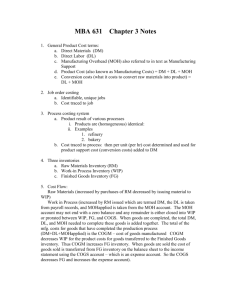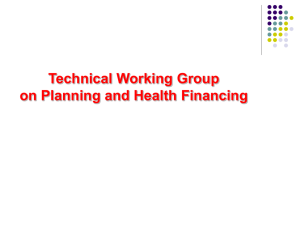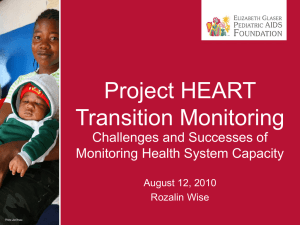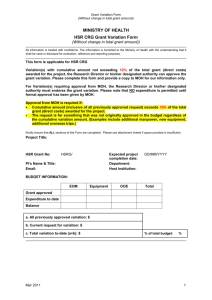Orientation
advertisement
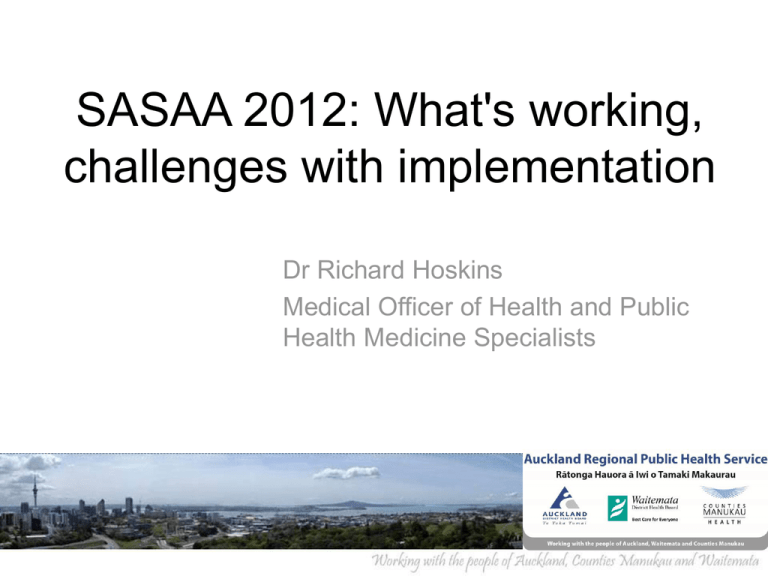
SASAA 2012: What's working, challenges with implementation Dr Richard Hoskins Medical Officer of Health and Public Health Medicine Specialists Role of Public Health Public health is defined as “the art and science of preventing disease, prolonging life and promoting health through the organized efforts of society”. ARPHS/MOH role: • Cover the region of the 3 Auckland DHBs (essentially same as AC) • Alcohol responsibilities through both SASAA and our contract with Ministry of Health • MOH are vocationally registered medical specialists, delegated by the Director General of Health Capacity of SASAA 2012 “Your thoughts on the capacity of the SSAA 2012 and its potential to achieve the new Object and to deliver on government intentions”: • Has potential for some gains around accessibility, but… • Without addressing: – – – – – minimum price marketing (incl. sponsorship) purchase age drink drive (separate Act) More on accessibility • It is insufficient to change our hazardous alcohol culture Successes to date “What successes, positive impacts, and emerging best practice examples have you seen so far?” • National maximum hours are having some impact (not enough, but some) • Communities are mobilising and expressing their views more frequently, eloquently, and forcefully… • MOH occasionally gets some desirable results (Elmgrove School Fundraiser, Masterton off licence, …) Challenges and Limitations “What have been the key challenges/limitations during the first year of implementation and why do you think this?” 1. Role of MOH not clearly articulated/recognised: a. b. Harm minimisation is our expertise Different paradigms for evidence i. ii. Medical research vs Local evidence Our ethical obligation 2. MOH effectiveness in “Judicial” settings Harm Minimisation • MOH role (inquire, report, be consulted) explicitly expanded and mandated in SASAA cf SOLA, and by delegation that or Compliance Officers • No substantive rationale given for that mandate in SASAA / leadup • MOH competence is public health medicine (improving and protecting the health of populations) including harm minimisation • Harm minimisation is the objective of SASAA, so our conclusion is that MOH is to be “trusted informer to DLC/ARLA/Council on medical evidence” • Yet our expert advice often rejected at LC / ARLA, leaving us to wonder: “Why are we here?” Paradigms of “evidence” • MOH training and skills are in applying the best scientific evidence to improve public health, we are professionally obligated to base our MOH advice on that evidence • Professionally: – We "look at what the best evidence says and advise based on that" – We must not "find evidence to support a position or viewpoint and present only that" What is evidence? • We are trained in critical appraisal of published evidence (separating the wheat from the chaff) Increasing reliance for ethical medical decision making and advice Apparent increasing reliance in legal (DLC / ARLA) decisions Anecdote For example: • Decisions often say they have placed little weight on our quoted research evidence because it is not “local” • But if a paediatrician could not treat a child from your local school with the best antibiotic because the research evidence had not been generated in that school this would be scandalous! Top priorities “What would be your top 3 priorities/ideas for the sector to improve outcomes, achieve better implementation and minimise harm” • Outcomes and harm: 1. Address the leadership deficit in SASSA: i. ii. iii. Implement minimum prices Raise purchase age Restrict marketing 2. Achieve better implementation of current SASAA (only really addresses “reduce access” issue): i. ii. iii. iv. Define role of MOH and how DLC/ARLA are to appraise their evidence Remove “local evidence (only)” barrier in decision making Remove influence of those that profit from alcohol sale and supply Provide national leadership and resourcing separate from politics In summary MOH are written into SASAA to support the harm minimisation object; unless decision makers recognise the expertise of MOH little progress will be made on this object. • MOH evidence and reports are explicit levers to help achieve harm minimisation, particularly with regard to – access provisions in LAP’s – recommendations on licence applications • MOH are expert public health advisers, discounting our advice will hinder achievement of the object of SASAA
